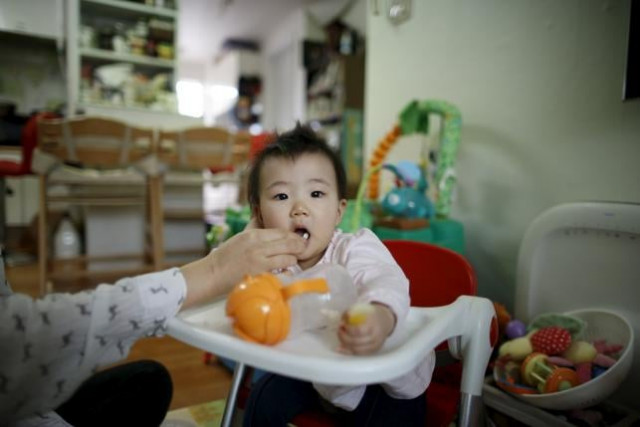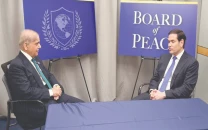Newborn disease outbreaks push South Korea to stiffen care centre oversight
The government says 265 babies caught infections, from respiratory to diarrhoeal diseases, in the first half of 2015

Jeong Bo-mi, 37, among a group of South Korean parents who sued a post-partum care centre seeking compensation after babies were infected with latent tuberculosis, takes care of her baby, who was not infected but was treated as a preventive measure, at her home in Seoul. PHOTO: REUTERS
But her baby boy caught latent tuberculosis during their stay, one of 30 infants who was infected by a nursing assistant.
No link between contraceptive pill and birth defects: study
"I never thought my baby could get sick," said Kim, 36, who sued the centre's owner, seeking compensation, along with the families of 79 other babies similarly infected or treated to prevent infection.
Growing concern over infection risks in such facilities has prompted South Korea to propose tighter regulation of the sometimes luxurious centres, which usually put babies in nurseries with other newborns, separate from their mothers.
The care centres have caught on so dramatically, since emerging in the late 1990s, that entrepreneurs are taking the business model overseas, an effort backed by the government.
The centre where Kim stayed is run by YK Dongrami, South Korea's biggest postnatal care brand, which has 16 domestic centres and five in China.
Following the incident involving Kim's baby, the company is working to create a safer, cleaner environment, it told Reuters. In August, it apologised on its website for the incident.
South Korea had 610 for-profit postnatal facilities last year, up from 377 in 2007.
But the health ministry says the centres are vulnerable to infection and hamper mother-child bonding.
The government says 265 babies caught infections, from respiratory to diarrhoeal diseases, in the first half of 2015, the latest data available. That figure compares with just 88 in all of 2014.
Another centre suspended operations this year after 15 babies caught rota virus, which can cause diarrhoea.
No deaths have been traced to South Korea's post-natal centres in recent years.
APART AND TOGETHER
Two weeks' stay at a centre typically costs $2,000 - with the plushest rising to $20,000 - and includes massages for the mothers, and sometimes yoga, along with baby care lessons.
At feeding time, nurses bring babies to their mothers or put them together in special rooms.
Health and well-being: PIMS to have children’s psychiatry department
Most of the time, nurses look after the babies grouped about 10 or 20 in a room, though the World Health Organisation advises that mother and child share a room, to promote bonding.
Clustering newborns together heightens infection risks, say experts and officials.
"Newborns have a weaker immune system, so post-partum care centres are even more vulnerable," said Chey Myoung-jae, a paediatrics professor at the private Inje University Sanggye Paik Hospital in Seoul.
The industry acknowledges shortcomings, but points to the expense of additional care givers.
"If a mother stays with her baby all the time, and an individual caretaker is attached to each mother, then it makes services too expensive," said Kim Jeong-uk, director of the Korea Postpartum Care Centers Association.
MODERN TRADITION
The centres have evolved from South Korea's tradition of "sanhujori," in which experienced mothers or mothers-in-law help new mothers care for their infants.
The government's new rules will encourage shared rooms for mothers and babies, and mandate tuberculosis tests for new hires.
"We are supplementing current laws to send a strong message for the safety of the postpartum care centers from infections," health ministry official Woo Hyang-jae told Reuters.
Postnatal care company Dongrami says requiring mothers and babies to share a room might "restrict customers' right to choose" services.
Some mothers said the centres are the only affordable, accessible choice for postnatal care nowadays.
Medical advice: ‘A healthy lifestyle can prevent cancer’
“We don’t have any family living nearby. Realistically our only option was to go to a care centre," said Jeong Bo-mi, 37, who is among the plaintiffs in the lawsuit. Her baby was treated as a preventive measure, and eventually tested negative for latent tuberculosis.



















COMMENTS
Comments are moderated and generally will be posted if they are on-topic and not abusive.
For more information, please see our Comments FAQ